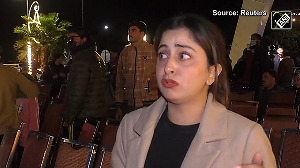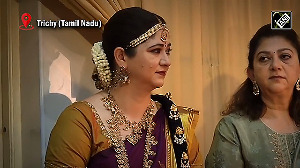Charles Sobhraj, currently serving life imprisonment in Kathmandu for the murder of an American woman over three decades ago, has alleged that Nepal's Supreme Court was delaying a verdict on his appeal due to fear of media criticism.
63-year-old Sobhraj, also known as 'Bikini Killer', said that he was shocked over the recent decision of the Supreme Court to reopen a fake passport case against him, which was earlier dismissed by the lower courts.
French national Sobhraj, who is half-Indian and half-Vietnamese, had filed an appeal before the apex court against the Kathmandu District Court's verdict awarding him life sentence for murdering American backpacker Connie Bronzich in 1975. Besides Bronzich, police had accused him of murdering her Canadian companion Laurent Armand Carriere, but he was convicted by the lower court of killing Bronzich only.
Last week, a two-judge Supreme Court bench delayed a verdict on his appeal against the life sentence, but ordered reopening of the fake passport case which, it said, would be heard along with the murder case.
In an e-mail statement to various media organizations from the Central Jail of Kathmandu where he is lodged, Sobhraj, who is often described as 'serpent" for his skills at deception and evasion, claimed that he was innocent and had become a victim of injustice in the Himalayan nation.
He alleged that Nepal's judiciary was scared of a section of the media due to which it was delaying a verdict in his case.
The international fugitive claimed that fearing media criticism, the judges hesitated to apply Nepal's laws and international practices in his case.
Drawing the attention of French President Nicolas Sarkozy, the International Commission of Jurists, Nepal Parliament Speaker Subhash Nemwang, Chief Justice Kedar Prasad Giri and his French Lawyer Isabelle Coutant Peyre, Sobhraj said that the apex court did not issue a verdict on his appeal though all facts to reach a final decision were available.
He also claimed that many Nepalese have been convicted in various cases without a single witness, while terming as 'illegal' a verdict without trial.
Earlier, Sobhraj had sent a written statement to the Nepal Supreme Court claiming that his conviction by the District Court was based on false news reports and documents without any eyewitness account being produced by the prosecution.
Sobhraj was arrested on September 19, 2003 from Casino Royale in Kathmandu. He is suspected to have killed at least 12 travelers in India, Thailand and Nepal in 1970s and is also linked to drug rackets and forgery cases in the three countries.






 © 2025
© 2025